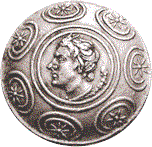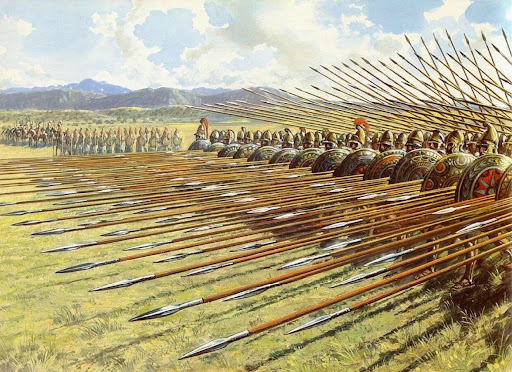Meeting Your Maker, Part III; Dalmatia, Autumn, 4th year of the 127th Olympiad (269 BCE)
For a year or more I lounged in Pella, the capital of my fathers people, meeting for the first time my half-brother Alkyoneos. He was two-and-twenty years of age when I met him, considered a man grown in the eyes of all, a scholarly son who was never seen without his personal historian and a rather queer actor that capered and moved by his side everywhere he went. Though he was dull, never taking part in Makedonian pastimes such as hunting or drinking, he was no dullard but in fact very astute and sharp as a spear-point. Combined with his charm and wit, a loyalty to his father unknown among other bloodlines, and his ever-cheerful disproportion, it mattered little that he had made himself wealthy by underhanded means for as a trader he was truly not blessed by the Gods and thus was forced to rely on more crooked methods to achieve personal abundance.
“Hail, Alkestis,” he greeted me on our first meeting, both walking the halls of the palace and lost in our own thoughts, “my brother and my blood.”
It was almost dreamlike as he embraced me, his strong arms only having seen battle once or twice, but his entire manner that of a man who knew how to kill without remorse. A man who, I dare say, was more than capable of killing his own brother if he had the will to do so.
“Alkyoneos, brother, it is good to meet you at last.”
We were both of us pleased with the other, getting on as close friends and blood-relations, talking of our families and upbringings and all that we could think up on our long rides together in the Makedonian hills and woodlands. It was during one such excursion into the woodlands that he told me of his wish not to become King, to study and write and to remain in the background of his fathers glory.
“You have enough for the both of us, I think,” he laughed after taking a long swig of imported wine, “I think I shall be the scholar and you, my young sibling, shall play the soldier. What do you say to that?”
“I accept!” I bellowed, letting out a loud belch, more intoxicated than I should have been but still able to think for myself.
Little could I have anticipated, on that early spring day, that the prediction of my brother would prove right. Even as we lazed in the dim sunlight and drunk ourselves stupid, one of the only times I ever saw Alkyoneos in such a state, our father was gathering his forces to him and preparing to march north-west into the hills and mountainous terrain of Illyrian Dalmatia.
“You shall ride with your own kin, my son,” he announced when I next saw him, his eyes rimmed with deep shadows and his beard and hair even whiter than it had been before, “an ilè of Thessalians have just arrived from Pharsalos. I believe you would be happier among your own people, but I shall send Hermon with you if that is what you wish?”
I was unwilling to leave my fathers side and, had I not understood why he was doing this, I may well have shouted or raised my voice. I knew, however, that being among other Thessalians would be best for me, their language and customs being those of the people I had spent my short life so far in the midst of. If I could not make myself comfortable in their company then where could I?
“I accept this honour, father. As for Hermon, I shall let him make his own decision, but I would like his company.”
What followed was a lesson in campaigning that lasted many months, myself placed with the Thessalians and given my own baggage-carrier – a younger lad than myself from Korinth – as well as a horse of my choosing and a suit of armour for my own. I chose a fine and tall horse with the blackest coat I have ever seen, darker than night and probably as deep as the pits of the Underworld, but accustomed to the noises and heat of battle as well as being possessed of exceptional stamina. My armour, such as it was, took the form of a bronze thorax, a pair of greaves, and an open 'Boeotian' helmet complete with three flowing plumes of horsehair. The baggage carrier I knew little about, save that he was something of a hostage and his name was Brison, a boy exchanged with his father for his eldest son who had been taken in battle. On the march he walked with the other skeuophoroi, carrying my lance and armour, and I would glance at him from time-to-time and quickly look away if he saw me looking. I had no idea why, but I did suspect that I would find out later.
If you have never seen an army on the march then it is hard to describe, so many trampling feet and the sights and the smells, the clinking of armour and weapons and the shouts for water along the line, nearly two-thousand phalangites pounding their sandalled feet against rock and dirt, horsemen driving their mounts along the flanks and rear, and mercenary Keltoi and Thrakians riding ahead to scout a path. Each night this entire mass would settle in one spot, sentries placed about the camp and the sound of snoring or drunken bellows replacing the heaves and grunts of the march.
Weeks passed swiftly, my shoulders being stripped red and raw by my unfamiliar armour, though my thighs were hardened to riding since before I could walk. It was a good life with my countrymen, our coarse dialect and crude jokes suitable to cover a fierce pride and mastery of mounted combat that the Hellenes of the south did not possess. We were only ever outmatched in the army of Antigonos by his own Royal Wing of horsemen, his Companions, those that never left his side and surrounded him on the field of battle. I still remember when an Agrianian peltast tried to kill a Thessalians horse for some meat, his own stomach emptier than his head apparently was, and was found dead the next morning.
Why did we march? Now that is the question!
We marched from Pella and into the hills because Pyrrhos was being lazy. He remained within his capital in Epiros, eating and drinking and sending his sons to attack northern barbarian tribes, but as for himself there was not one sighting. For a number of days we pursued Helenos, one of two brothers abroad in the mountains, wasting valuable time and energy as he ran before us and disappeared back to Epiros without so much as giving battle.
Then, after nearly losing all hope, an excited scout arrived and demanded to see the King. In a matter of minutes we were assembled and on the move, for Alexandros Aiakides had been seen hunting in the hills not far from us with only fifty of his closest companions.
I still remember that day...
There is not much to tell, but I shall try.
In the morning of a cold autumn day our army came upon them, encamped near the coast in a ruined watchtower. Perhaps they had been there for days, or even weeks, we did not know, riding out each day to hunt the plentiful game and dangers in the hills of Dalmatia. By the time they knew we were coming it was far too late.
“The Thrakians and Keltoi I think,” laughed my father, “send our Greek friends and the Thessalians just to make sure.”
The feral mercenaries took off like an arrow from a bow, their horses carrying them like the wind toward the hurriedly formed line of horsemen, each man ready to die for his ruler and friend. How I wish they had ran, even as I tapped the flanks of my own mount, urine running down my leg as I thought of riding against an enemy for the first time, two-hundred Greek horsemen from Athens and Ionia on either side of us, all of us simply there to support the outsiders should they decide to flee or turn against their paymaster.
What happened next was a massacre, the Thrakians and Keltoi striking the Epirotes like a blade through soft flesh, curved blades rose and fell like autumn leaves and very soon the horses were washing their hooves in blood and excrement. Thirty or so of our paid cavalry fell that day, their own people grieving for them in their own unintelligible way, Alexandros himself struck down by a Thrakian cleaver as he tried to defend himself. His body was not defaced, but picked from the pile of the dead, and bought to Antigonos who bade that it be washed and sent with all ritual and speed to Ambrakia where his father would soon be mourning.
“We make camp in these hills, make sure all have food and water. If this course does not bring the old fox out of his hole then I know not what shall.” I heard him say, “tonight I shall weep for him.”
That day and night I hid in my tent, ashamed as dirtying myself over nothing, Brison trying his best to comfort me. When the chill came, and frost began to form on the ground, I invited him into my cot and together we slept peacefully through the night. I dreamt of Alexandros, son of Pyrrhos, his bearded face all bloodied and pale, and swore in my mind that I would never disgrace myself in such a shameful way again. In the morning I awoke and turned my head, the handsome and soft form of Brison still snoring softly beside me, my head resting back and staring up at the fabric of my tents ceiling.
What would happen now, I wondered in my head, will Pyrrhos really come to avenge his sons death or would he risk shame and remain where he was? In the south the Greeks and their Leagues were stirring up trouble again, and in Korinth is was known that the nephew of my father was disloyal.
Indeed I was living in very interesting times.











 Reply With Quote
Reply With Quote














